时态和语态语法讲解和练习
- 格式:doc
- 大小:97.50 KB
- 文档页数:8
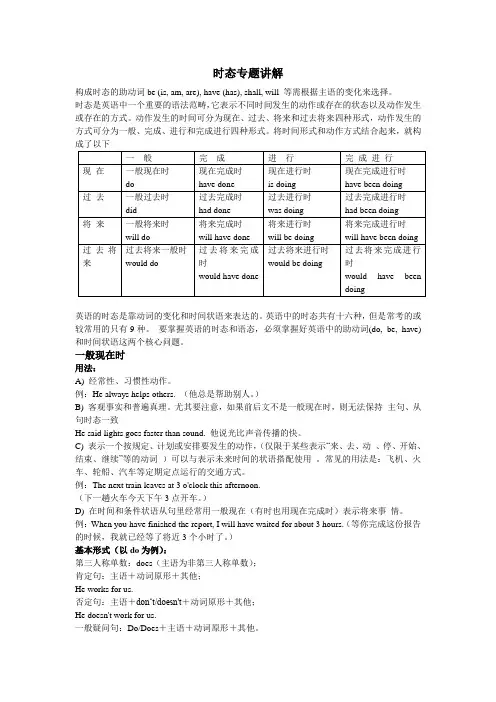
时态专题讲解构成时态的助动词be (is, am, are), have (has), shall, will 等需根据主语的变化来选择。
时态是英语中一个重要的语法范畴,它表示不同时间发生的动作或存在的状态以及动作发生或存在的方式。
动作发生的时间可分为现在、过去、将来和过去将来四种形式,动作发生的方式可分为一般、完成、进行和完成进行四种形式。
将时间形式和动作方式结合起来,就构成了以下一般完成进行完成进行现在一般现在时do 现在完成时have done现在进行时is doing现在完成进行时have been doing过去一般过去时did 过去完成时had done过去进行时was doing过去完成进行时had been doing将来一般将来时will do 将来完成时will have done将来进行时will be doing将来完成进行时will have been doing过去将来过去将来一般时would do过去将来完成时would have done过去将来进行时would be doing过去将来完成进行时would have beendoing英语的时态是靠动词的变化和时间状语来表达的。
英语中的时态共有十六种,但是常考的或较常用的只有9种。
要掌握英语的时态和语态,必须掌握好英语中的助动词(do, be, have)和时间状语这两个核心问题。
一般现在时用法:A) 经常性、习惯性动作。
例:He always helps others. (他总是帮助别人。
)B) 客观事实和普遍真理。
尤其要注意,如果前后文不是一般现在时,则无法保持主句、从句时态一致He said lights goes faster than sound. 他说光比声音传播的快。
C) 表示一个按规定、计划或安排要发生的动作,(仅限于某些表示“来、去、动、停、开始、结束、继续”等的动词)可以与表示未来时间的状语搭配使用。
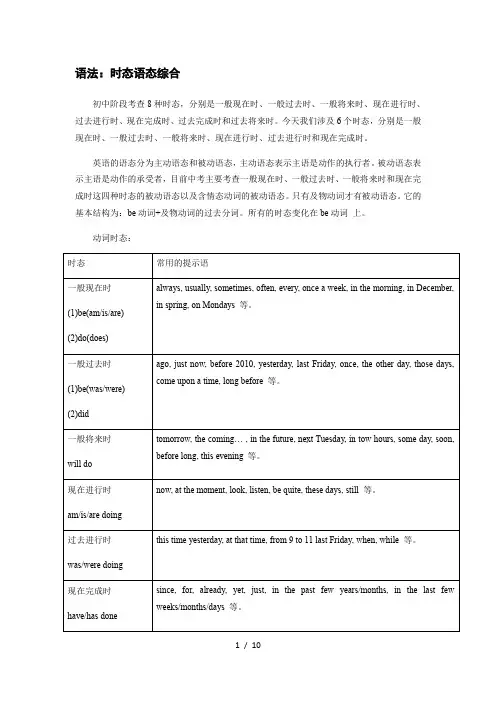
语法:时态语态综合初中阶段考查8种时态,分别是一般现在时、一般过去时、一般将来时、现在进行时、过去进行时、现在完成时、过去完成时和过去将来时。
今天我们涉及6个时态,分别是一般现在时、一般过去时、一般将来时、现在进行时、过去进行时和现在完成时。
英语的语态分为主动语态和被动语态,主动语态表示主语是动作的执行者。
被动语态表示主语是动作的承受者,目前中考主要考查一般现在时、一般过去时、一般将来时和现在完成时这四种时态的被动语态以及含情态动词的被动语态。
只有及物动词才有被动语态。
它的基本结构为:be动词+及物动词的过去分词。
所有的时态变化在be动词上。
动词时态:动词语态注意以下几种被动语态的特殊情况:一.被动语态中不定式要还原Let/make/see/hear/watch sb. do sth.----- sb. be let/made/seen/heard/watched to do sth.My mother made me look after the little sister yesterday.----I was made to look after the little sister by my mother yesterday.二.有些动词没有被动语态。
(及物动词才有被动语态)1) 不及物动词或动词短语无被动语态:appear, die,disappear, end (vi. 结束), fail, happen, last, lie, remain, sit, spread, stand break out, come true, fall asleep, keep silence, lose heart, take place.2) 系动词无被动语态:appear, be,become, fall, feel, get, grow, keep, look, remain, seem, smell, sound, stay, taste, turn3) 不能用于被动语态的及物动词或动词短语:fit, have, hold, marry, own, wish, cost, notice, watch,agree with, arrive at / in, shake hands with, succeed in, suffer from, happen to, take part in, walk into, belong to4) 系动词无被动语态:appear, be,become, fall, feel, get, grow, keep, look, remain, seem, smell, sound, stay, taste, turn5) 当宾语是不定式时,很少用于被动语态。
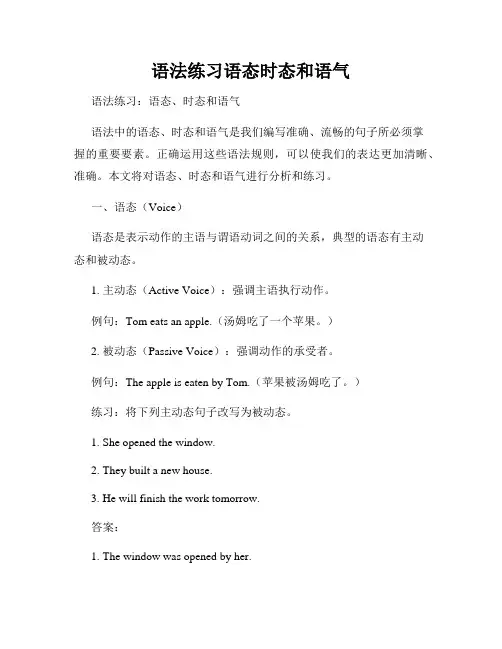
语法练习语态时态和语气语法练习:语态、时态和语气语法中的语态、时态和语气是我们编写准确、流畅的句子所必须掌握的重要要素。
正确运用这些语法规则,可以使我们的表达更加清晰、准确。
本文将对语态、时态和语气进行分析和练习。
一、语态(Voice)语态是表示动作的主语与谓语动词之间的关系,典型的语态有主动态和被动态。
1. 主动态(Active Voice):强调主语执行动作。
例句:Tom eats an apple.(汤姆吃了一个苹果。
)2. 被动态(Passive Voice):强调动作的承受者。
例句:The apple is eaten by Tom.(苹果被汤姆吃了。
)练习:将下列主动态句子改写为被动态。
1. She opened the window.2. They built a new house.3. He will finish the work tomorrow.答案:1. The window was opened by her.2. A new house was built by them.3. The work will be finished by him tomorrow.二、时态(Tense)时态是表示动作发生的时间,常见的时态有一般现在时、一般过去时、一般将来时等。
1. 一般现在时(Simple Present):表示经常性或普遍性的动作或状态。
例句:She works in a hospital.(她在医院工作。
)2. 一般过去时(Simple Past):表示过去发生的动作或状态。
例句:I studied English last night.(昨晚我学英语了。
)3. 一般将来时(Simple Future):表示将来发生的动作或状态。
例句:We will visit our grandparents next month.(下个月我们将去拜访祖父母。
)练习:将下列句子改写为对应时态。
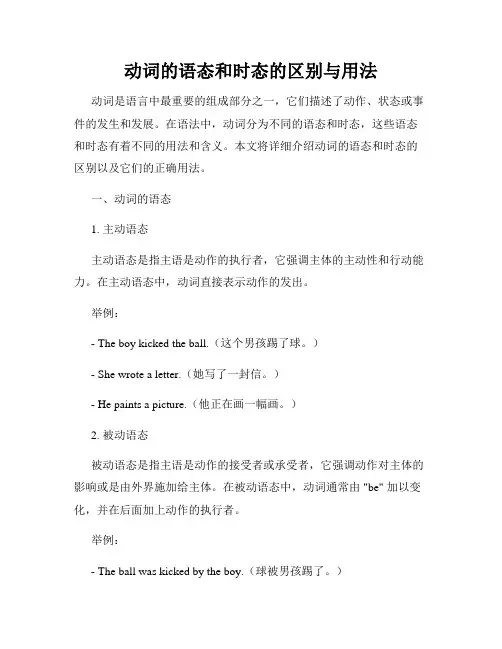
动词的语态和时态的区别与用法动词是语言中最重要的组成部分之一,它们描述了动作、状态或事件的发生和发展。
在语法中,动词分为不同的语态和时态,这些语态和时态有着不同的用法和含义。
本文将详细介绍动词的语态和时态的区别以及它们的正确用法。
一、动词的语态1. 主动语态主动语态是指主语是动作的执行者,它强调主体的主动性和行动能力。
在主动语态中,动词直接表示动作的发出。
举例:- The boy kicked the ball.(这个男孩踢了球。
)- She wrote a letter.(她写了一封信。
)- He paints a picture.(他正在画一幅画。
)2. 被动语态被动语态是指主语是动作的接受者或承受者,它强调动作对主体的影响或是由外界施加给主体。
在被动语态中,动词通常由 "be" 加以变化,并在后面加上动作的执行者。
举例:- The ball was kicked by the boy.(球被男孩踢了。
)- A letter was written by her.(一封信被她写了。
)- The picture is being painted by him.(这幅画正在被他画。
)被动语态多用于强调动作的接受者或者主体的无法执行动作的情况。
二、动词的时态1. 现在时现在时态用于表示目前正在进行或经常发生的动作、状态或事件。
举例:- I go to school every day.(我每天去学校。
)- She is reading a book now.(她现在在读一本书。
)- They often play football on weekends.(他们经常在周末踢足球。
)2. 过去时过去时态用于表示已经发生或已经结束的动作、状态或事件。
举例:- I went to the park yesterday.(我昨天去了公园。
)- He studied in the library for three hours.(他在图书馆学习了三个小时。
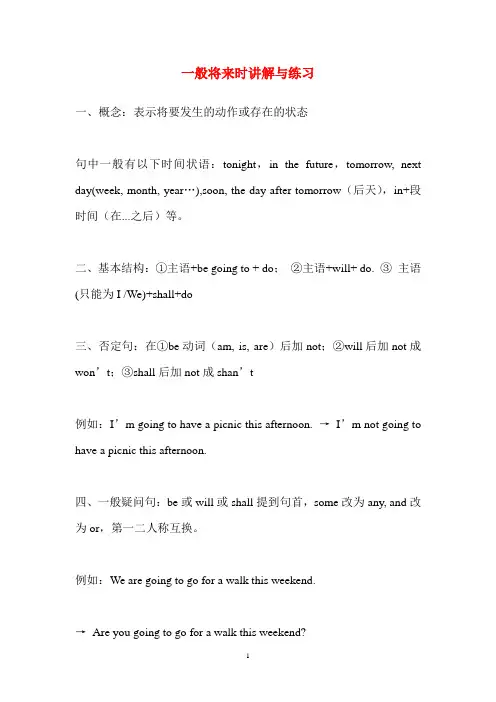
一般将来时讲解与练习一、概念:表示将要发生的动作或存在的状态句中一般有以下时间状语:tonight,in the future,tomorrow, next day(week, month, year…),soon, the day after tomorrow(后天),in+段时间(在...之后)等。
二、基本结构:①主语+be going to + do;②主语+will+ do. ③主语(只能为I /We)+shall+do三、否定句:在①be动词(am, is, are)后加not;②will后加not成won’t;③shall后加not成shan’t例如:I’m going to have a picnic this afternoon. →I’m not going to have a picnic this afternoon.四、一般疑问句:be或will或shall提到句首,some改为any, and改为or,第一二人称互换。
例如:We are going to go for a walk this weekend.→Are you going to go for a walk this weekend?五、对划线部分提问。
一般情况,一般将来时的对划线部分有三种情况。
1. 问人。
Who 例如:I’m going to New York soon. →Who’s going to New York soon.2. 问干什么。
What …do.例如:My father is going to watch a match with me this afternoon.→What is your father going to do with you this afternoon?3. 问什么时候。
When. 例如:She’s going to go to bed at nine. →When is she going to bed?六、同义句:be going to = willI am going to go swimming tomorrow. = I will go swimming tomorrow.七、be going to和will 的区别be going to和will 的用法虽然都表示将来发生动作或情况,但它们的用法是有区别的。
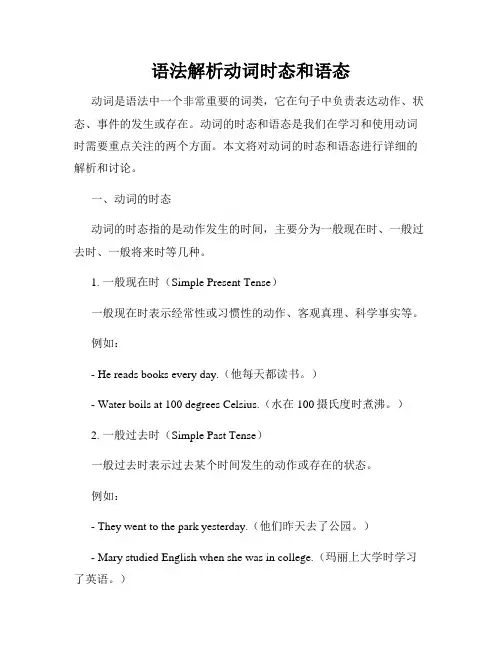
语法解析动词时态和语态动词是语法中一个非常重要的词类,它在句子中负责表达动作、状态、事件的发生或存在。
动词的时态和语态是我们在学习和使用动词时需要重点关注的两个方面。
本文将对动词的时态和语态进行详细的解析和讨论。
一、动词的时态动词的时态指的是动作发生的时间,主要分为一般现在时、一般过去时、一般将来时等几种。
1. 一般现在时(Simple Present Tense)一般现在时表示经常性或习惯性的动作、客观真理、科学事实等。
例如:- He reads books every day.(他每天都读书。
)- Water boils at 100 degrees Celsius.(水在100摄氏度时煮沸。
)2. 一般过去时(Simple Past Tense)一般过去时表示过去某个时间发生的动作或存在的状态。
例如:- They went to the park yesterday.(他们昨天去了公园。
)- Mary studied English when she was in college.(玛丽上大学时学习了英语。
)3. 一般将来时(Simple Future Tense)一般将来时表示将来某个时间将要发生的动作或存在的状态。
例如:- I will travel to Beijing next month.(我下个月将去北京旅行。
)- They are going to have a party tonight.(他们今晚将举办一个派对。
)除了上述的三种基本时态,动词还有一些其他的时态形式,如现在进行时、过去进行时、将来进行时、现在完成时、过去完成时、将来完成时等。
这些时态形式在表达不同的情况和语境时使用,可以增强句子的准确度和表达力。
二、动词的语态动词的语态指的是动作的主体和所受到的影响,主要分为主动语态和被动语态两种。
1. 主动语态(Active Voice)主动语态表示主体执行动作或发生状态。
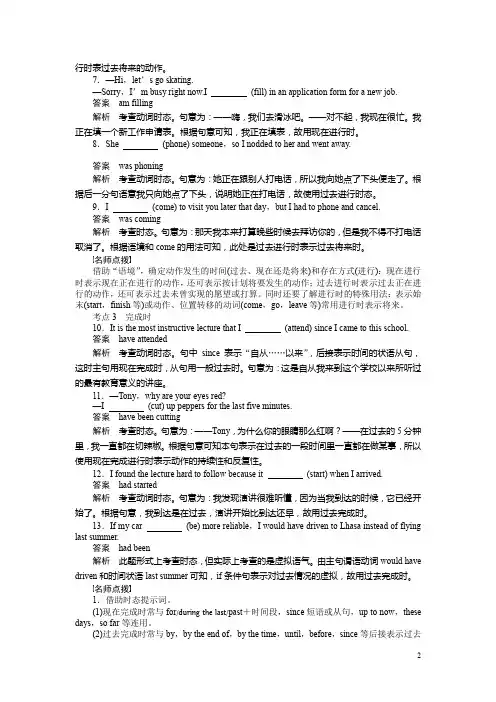
新课标高考英语语法动词的时态和语态高考真题例析动词的时态和语态考点1一般时1.On Monday mornings it usually (take) me an hour to drive to work although the actual distance is only 20 miles.答案takes解析句意为:通常在周一早上我要开一个小时的车去上班,尽管实际上只有二十英里的路程。
由usually以及从句时态,可知应用一般现在时。
2.I’m calling about the apartment you (advertise) the other day.Could you tell me more about it?答案advertised解析考查时态。
第一句句意为:我打电话咨询你昨天登广告的那所公寓。
根据the other day可知,该空处为一般过去时态。
3.—What time is it?—I have no idea.But just a minute,I (check) it for you.答案will check解析考查动词时态。
句意为:——什么时间了?——我不知道。
等一会儿,我给你查查。
根据句意以及just a minute可知,动作check发生于将来,故用一般将来时。
4.You’d better write down her phone number before you (forget) it.答案forget解析考查时态。
句意为:趁着还没忘记,你最好把她的电话号码写下来。
before引导一个表示“将来”的时间状语从句,在时间状语从句中用一般现在时代替将来时。
5.—Haven’t seen you for ages!Where have you been?—I went to Ningxia and (stay) there for one year,teaching as a volunteer.答案stayed解析考查时态。
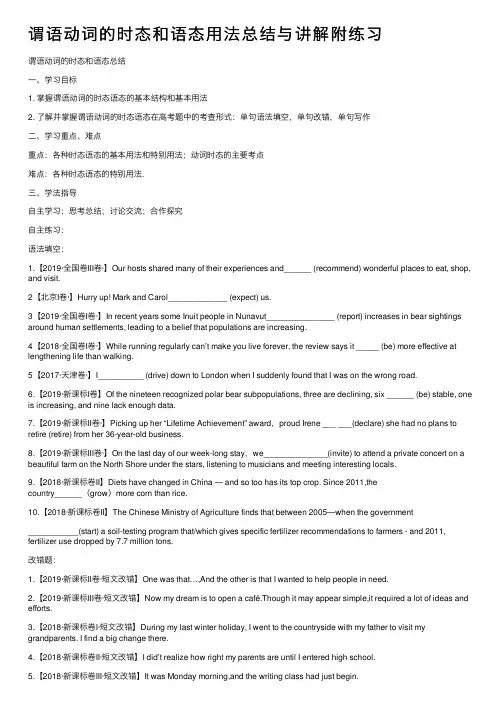
谓语动词的时态和语态⽤法总结与讲解附练习谓语动词的时态和语态总结⼀、学习⽬标1. 掌握谓语动词的时态语态的基本结构和基本⽤法2. 了解并掌握谓语动词的时态语态在⾼考题中的考查形式:单句语法填空,单句改错,单句写作⼆、学习重点、难点重点:各种时态语态的基本⽤法和特别⽤法;动词时态的主要考点难点:各种时态语态的特别⽤法.三、学法指导⾃主学习;思考总结;讨论交流;合作探究⾃主练习:语法填空:1.【2019·全国卷III卷·】Our hosts shared many of their experiences and______ (recommend) wonderful places to eat, shop, and visit.2【北京I卷·】Hurry up! Mark and Carol_____________ (expect) us.3【2019·全国卷I卷·】In recent years some Inuit people in Nunavut_______________ (report) increases in bear sightings around human settlements, leading to a belief that populations are increasing.4【2018·全国卷I卷·】While running regularly can’t make you live forever, the review says it _____ (be) more effective at lengthening life than walking.5【2017·天津卷·】I__________ (drive) down to London when I suddenly found that I was on the wrong road.6.【2019·新课标I卷】Of the nineteen recognized polar bear subpopulations, three are declining, six ______ (be) stable, one is increasing, and nine lack enough data.7.【2019·新课标II卷·】Picking up her “Lifetime Achievement” award,proud Irene ___ ___(declare) she had no plans to retire (retire) from her 36-year-old business.8.【2019·新课标III卷·】On the last day of our week-long stay,we______________(invite) to attend a private concert on a beautiful farm on the North Shore under the stars, listening to musicians and meeting interesting locals.9.【2018·新课标卷II】Diets have changed in China — and so too has its top crop. Since 2011,thecountry______(grow)more corn than rice.10.【2018·新课标卷II】The Chinese Ministry of Agriculture finds that between 2005—when the government___________(start) a soil-testing program that/which gives specific fertilizer recommendations to farmers - and 2011, fertilizer use dropped by 7.7 million tons.改错题:1.【2019·新课标II卷·短⽂改错】One was that…,And the other is that I wanted to help people in need.2.【2019·新课标III卷·短⽂改错】Now my dream is to open a café.Though it may appear simple,it required a lot of ideas and efforts.3.【2018·新课标卷I·短⽂改错】During my last winter holiday, I went to the countryside with my father to visit my grandparents. I find a big change there.4.【2018·新课标卷II·短⽂改错】I did’t realize how right my parents are until I entered high school.5.【2018·新课标卷III·短⽂改错】It was Monday morning,and the writing class had just begin.6.【2017·新课标卷III·短⽂改错】I had grown not only physically,but also mentally in the past few years.思考总结:动词的时态和语态概述:1.含义:动词的时态和语态是英语___________的形式,表⽰动作发⽣的时间和所处的状态.2. 学习思路:1).时态和语态重在理解,注意语境;2).要建⽴时,体,语态概念;时---现在时,过去时,将来时,过去将来时(事情发⽣在什么时候,注意主从句)体---⼀般体,进⾏体,完成体,完成进⾏体(动作处于什么状态;经常/进⾏/完成等)语态---主动,被动(主语和动词的关系,主谓or动宾)3.动词的时态和语态解题技巧:1)时间标志词法——不同的时态有与其搭配的时间词汇和短语,这些时间标志词或短语会提⽰应使⽤何种语态.2)语境推断法----有时句中⽆时间标志词或短语,这时需要联系主句或分句中的谓语并结合句意综合判断,推测出使⽤何种时态.3)固定句型提⽰法----在⼀些句型中,使⽤何种时态往往有其规律,判断句型有助于解答时态题,但注意理解句意仍是前提.①It/This is the +序数词+time+that从句(现在完成时)It/This was the +序数词+time+that从句(过去完成时)②It is/ has been+⼀段时间+since从句(⼀般过去时)It was/ had been+⼀段时间+since从句(过去完成时)③Was/were about to do…when从句(⼀般过去时)④Was/were doing…when从句(⼀般过去时)⑤It will be+⼀段时间+before从句(⼀般现在时)It was+⼀段时间+before从句(⼀般过去时)⑥Hardly had…done…when从句(⼀般过去时)No sooner had…done…than从句(⼀般过去时)⑦祈使句+and/or+陈述句(常⽤⼀般将来时)⑧while引导的时间状语从句中谓语动词为延续性动词,时态多为现在进⾏时或过去进⾏时动词的时态和语态详解:⼀、动词的时态:1.⼀般现在时谓语动词的结构:______________________1)表⽰现状、性质、状态和经常性的或习惯性的动作。
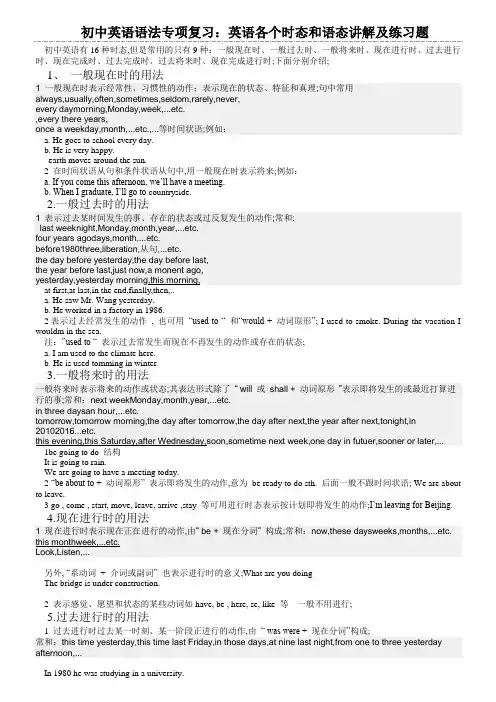
初中英语语法专项复习:英语各个时态和语态讲解及练习题初中英语有16种时态,但是常用的只有9种:一般现在时、一般过去时、一般将来时、现在进行时、过去进行时、现在完成时、过去完成时、过去将来时、现在完成进行时;下面分别介绍;1、一般现在时的用法1 一般现在时表示经常性、习惯性的动作;表示现在的状态、特征和真理;句中常用always,usually,often,sometimes,seldom,rarely,never,every daymorning,Monday,week,...etc.,every there years,once a weekday,month,...etc.,...等时间状语;例如:a. He goes to school every day.b. He is very happy.earth moves around the sun.2 在时间状语从句和条件状语从句中,用一般现在时表示将来;例如:a. If you come this afternoon, we’ll have a meeting.b. When I graduate, I’ll go to countryside.2.一般过去时的用法1 表示过去某时间发生的事、存在的状态或过反复发生的动作;常和:last weeknight,Monday,month,year,...etc.four years agodays,month,...etc.before1980three,liberation,从句,...etc.the day before yesterday,the day before last,the year before last,just now,a monent ago,yesterday,yesterday morning,this morning,at first,at last,in the end,finally,then,..a. He saw Mr. Wang yesterday.b. He worked in a factory in 1986.2表示过去经常发生的动作, 也可用“used to “ 和“would + 动词原形”; I used to smoke. During the vacation I wouldm in the sea.注:”used to “ 表示过去常发生而现在不再发生的动作或存在的状态;a. I am used to the climate here.b. He is used tomming in winter.3.一般将来时的用法一般将来时表示将来的动作或状态;其表达形式除了“ will 或shall + 动词原形”表示即将发生的或最近打算进行的事;常和:next weekMonday,month,year,...etc.in three daysan hour,...etc.tomorrow,tomorrow morning,the day after tomorrow,the day after next,the year after next,tonight,in 20102016...etc.this evening,this Saturday,after Wednesday,soon,sometime next week,one day in futuer,sooner or later,...1be going to do 结构It is going to rain.We are going to have a meeting today.2 “be about to + 动词原形” 表示即将发生的动作,意为be ready to do sth. 后面一般不跟时间状语; We are about to leave.3 go , come , start, move, leave, arrive ,stay 等可用进行时态表示按计划即将发生的动作;I’m leaving for Beijing.4.现在进行时的用法1 现在进行时表示现在正在进行的动作,由“ be + 现在分词” 构成;常和:now,these daysweeks,months,...etc. this monthweek,...etc.Look,Listen,...另外, “系动词+ 介词或副词” 也表示进行时的意义;What are you doingThe bridge is under construction.2 表示感觉、愿望和状态的某些动词如have, be , here, se, like 等一般不用进行;5.过去进行时的用法1 过去进行时过去某一时刻、某一阶段正进行的动作,由“ was were + 现在分词”构成;常和:this time yesterday,this time last Friday,in those days,at nine last night,from one to three yesterday afternoon,...In 1980 he was studying in a university.He was reading a novel when I came in.6.现在完成时的用法现在完成时由“have/has + 过去分词.其使用有两种情况:1 现在完成时所表示的动作在说话之前已完成,但对现在有影响;句中没有具体时间状语;常和:just,alreadly,yet,never,ever,now,before,this week,today,these days,once,twice,three times,...He has gone to Fuzhou.He has been to Fuzhou.2 现在完成时所表示的动作开始于过去,持续到现在,也许还会持续下去常用for 和since表示一段时间的状语或since then1949,last Monday,two o'clock,从句...,etc.,ever since then,for three daysa long time,two hours,...etc.so far , now, today, this wek month, year 等表示包括现在内的状语;He has studied English for 5 years.He has studied English since 1985.Now I have finished the work..注意:表示短暂时间动作的词如come, go , die, marry, buy 等的完成时不能与for, since 等表示一般时间的词连用;正确:I have bought the book already.错误:I have bought the book for two years.改:I have had the bookl for two years.7.过去完成时的用法1 过去完成时由“had + 过去分词”构成;过去完成时的动作表示过去某一时刻或某一时刻或某一动作之前完成的动作或状态;句中常用by then1977,yesterday,eight last night,the time we got there,...etc.by the end of last termweek,year,month,...etc..by, before, until, when 等词引导的时间状语;By the end of last year we had built five new houses.I had learnt 5000 words before I entered the university.2过去完成时的动词还可表示过去某一时刻之前发生的动作或状态持续到过去某个时间或持续下去;Before he slept, he had worked for 12 hours.8.过去将来时的用法过去将来时表示从过去的某个时间看来将要发生的动作或存在的状态;过去将来时由“should 或would + 动词原形” 构成;第一人称用should, 其他人称用would. ;常和:They were sure that they would succeed.二动词语态1.当句子的主语是动作的执行者时, 谓语的形式叫主动语态;句子的主语是动作承受者时,谓语的形式叫被动作语态;被动语态由助动词be + 过去分词构成,时态通过be 表现出来;1 一般现在时:You are required to do this.2 一般过去时:The story was told by her.3 一般将来时:The problem will be discussed tomorrow.4 现在进行时:The road is being widened.5 过去进行时:The new tool was being made.6 现在完成时:The novel has been read.7 过去完成时:He said that the work had been finished.8 过去将来时:He said that the trees would be planted soon.2. 一些特殊的被动结构1 带情态动词的被动结构:The problem must be solved soon.2 带不定式的被动结构:The room is going to be painted.The homework needs to be done with care.3 短语动词的被动:a.不及物动词+介词:若这类短语动词是及物性的,则可用于被动语态中,如:laugh at, look after, talk about, think of 等;若这类短语动词是不及物性的则不可用于被动语态中,如:book up, look down. 等b.及物动词+副词:bring about, carry out, find out, make out, put away, put off, take up, turn down, turn out, wipe out 等c. 动词+副词+介词:do away with, face up to, give into ,look down upon, make up with等d. 动词+名词+介词:catch sight of, keep on eye on, make a fool of , pay attention to , put an end to , set fire/light to , take notice of 等4 带复合宾语的动词在改为被动语态时,一般把主动结构中的宾语改为主语,宾语补足语保留在谓语后面;We always keep the classroom clean.比较:The classroom is always kept clean.5主动形式表示被动意义的词;常见的有:a.主动形式,这时动名词同句中的主语有动宾关系;The children need looking after.The windows wants /requires repairing.This point deserves mentioning.练习题1. It is a fine day. The sun __________shine brightly.2. They ___________visit the Science Museum next Sunday.3. Mr Brown________live in Beijing since he came to China.4. Mr Wang ________teach us English two years ago.5. The Smiths _______________ watch TV at this time last night.6. We __________learn about ten English songs by the end of last term.7. Father said that he ____________buy a new bike for me the next Friday.8. Bill isn¡¯t here. He ___________chat with his friends in the classroom.9. The teacher said that the moon __________go round the earth.10. The Young Pioneers will go to the zoo if it ____________not rain this Sunday.11. Listen They __________talk about the new film.12. Jim asked us what ___________happen in China in 1976.13. My mobile phone ___________steal on a bus last week.14. The host ____________interview the little boy just now.15. The Greens __________watch TV now.16. He said that he _____________ring me up when he got there.17. We ____________learn English for about three years.18. My brother_____________join the League in 1997.19. The farmers __________pick apples when I saw them.20. The red skirt __________cost the girl forty yuan.21. The film ____________begin when I got to the cinema.22. The girl told me that she wanted to be an English teacher when she _____grow up.23. My sister is a student and she _____________study at a middle school nearby.24. Mr Green __________travel to several places in South China since he came here.25. You _________catch the early bus if you get up early.26. _______you been________wear glasses all the time27. I’ll go home as soon as I _______finish my homework.29. Most science books are ______write in English.30. I ____________stay there for two months last year.31. Tell Lily to call me as soon as she _______.A. will arriveB. gets thereC. has goneD. reach here32. ----Hi, Kate. You look tired. What’s the matter ----I ______ well last night.A. didn’t sleepB. don’t sleepC. haven’t sleptD. won’t sleep33. ----Excuse me, look at the sign over there, please. Could you stop smoking----Sorry, I ____ that.A. didn’t seeB. don’t seeC. won’t seeD. can’t see34. ----Well, I found this. I think it must be yours. ----My watch Thank you. Where _____itA. do you findB. had you foundC. were you findingD. did you find35. ----Don you know when Dr White ____ for dinner this evening----No, but I think he ____ when he is free.A. will come; comesB. will come; will comeC. comes; comesD. comes; will come36. Look at those black clouds. It _____ rain. Let’s hurry. A. maybe B. would C. has D. is going to37. ----Jimmy is leaving for a holiday. ----Really Where ____ he ____A. has; goneB. will; goC. did; goD. does; go38. ----Shall we go shopping now ---Sorry, I can't. I ____ my shirts.A. washB. washesC. washedD. am washing39. ----I called you yesterday evening, but there was no answer.----Oh, I am sorry. I ___ dinner at my friend's home.A. haveB. hadC. was havingD. have had40. The Oriental Pearl TV Tower ____ thousands of visitors since 1995.A. attractedB. attractsC. has attractedD. will attract46. ----Why didn't you go to the cinema yesterday -----Because I ____ the film before.A. had seenB. have seenC. have watchedD. has watched47. I don't think John saw me. He ____ a book at that moment.A. just readB. has just readC. was just readingD. had just read48. Mr Smith ____ a book about China last year but I don't know whether he has finished it.A. has writtenB. wroteC. had writtenD. was writing49. Mr White ____ the newspaper while his daughter ____TV.A. has read; was watchingB. was reading; watchedC. was reading; was watchingD. reading; watched50. ---- I ____ you at the meeting. Why ----I was ill. A. saw B. have seen C. not see D. didn't see51. The 29th Olympic Games ____ in Beijing in 2008. A. hold B. will hold C. will be held D. held52. Hurry up The play ____ for ten minutes. A. has been on B. has begun C. had begun D. began53. ----May I speak to Mr Smith ----Sorry, he ____ Australia. But he ____ in two days.A. has been to; will come backB. has gone to; will be backC. has been in; would come backD. is leaving for; doesn't come back54. I can't go to the theater tonight because I ____ my ticket.A. have lostB. had lostC. will loseD. was losing55. ----What a nice bike How long ____ you ____ it ----Just two weeks.A. have; boughtB. did; buyC. have; hadD. are; having56. ----I'm sorry to have kept you waiting. ----Oh, not at all. I ____ here only for a few minutes.A. have comeB. had beenC. wasD. have been57. ----____ my dictionary anywhere ---- Yes. I saw it on your desk a moment ago.A. Did you seeB. If you seeC. Had you seenD. Would you see58. We were all surprised when he mad it clear that he ____ office soon.A. leavesB. would leaveC. will leaveD. had left答案:I. 1. shines/ is shining 2. are going to/ will visit 3. has lived 4. taught5. were watching6. had learned7. would buy8. is chatting9. goes 10.doesn't rain 11. are talking 12. happened 13. was stolen 14. interviewed15. are watching16. would ring 17. have learned 18. joined 19. were picking 20. cost21. had begun 22. grew 23. studies 24. has traveled 25. will catch26. Have; wearing 27. finish 28. haven't heard 29. written 30. stayedII. 31--35 BAADB 36--40 DBDCC 41--45 ACBAC 46--50 ACDCD51--55 CABAC 56--60 DABDA 61--65 BDBAB 66-70 BDABC 71--75 BCADD。
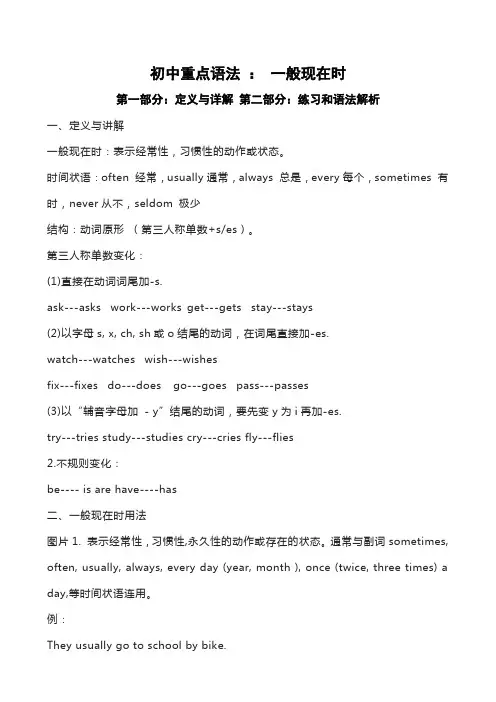
初中重点语法:一般现在时第一部分:定义与详解第二部分:练习和语法解析一、定义与讲解一般现在时:表示经常性,习惯性的动作或状态。
时间状语:often 经常,usually通常,always 总是,every每个,sometimes 有时,never从不,seldom 极少结构:动词原形(第三人称单数+s/es)。
第三人称单数变化:(1)直接在动词词尾加-s.ask---asks work---works get---gets stay---stays(2)以字母s, x, ch, sh或o结尾的动词,在词尾直接加-es.watch---watches wish---wishesfix---fixes do---does go---goes pass---passes(3)以“辅音字母加- y”结尾的动词,要先变y为i再加-es.try---tries study---studies cry---cries fly---flies2.不规则变化:be---- is are have----has二、一般现在时用法图片1. 表示经常性,习惯性,永久性的动作或存在的状态。
通常与副词sometimes, often, usually, always, every day (year, month ), once (twice, three times) a day,等时间状语连用。
例:They usually go to school by bike.I take the medicine three times a day.She helps her mother once a week.Mary’s father is a policeman.There are 50 students in my class.2. 表示客观真理,科学原理,自然现象,等客观事实或格言,谚语等。
例:The sun rises in the east and sets in the west every day.Tomorrow is Tuesday.三、一般现在时的句型转换(1)当句子中有be动词或情态动词时,则把be动词或情态动词(can,could等等)提到主语的前面变成疑问句;在be动词或情态动词后面加not变成否定句.例:①陈述句:She is a student.疑问句→Is she a student?否定句→She is not a student.②陈述句:I can swim.疑问句→Can you swim?否定句→I can not swim.(2) 当句子中即没有be动词,也没有情态动词时,则在主语前加助动词do (you,以及复数), does(单数she,he,it)变成问句;在主语后谓语动词前加助动词don’t(I,you,以及复数), doesn’t(单数she,he,it)变成否定句,助动词后的动词要变成动词原形。
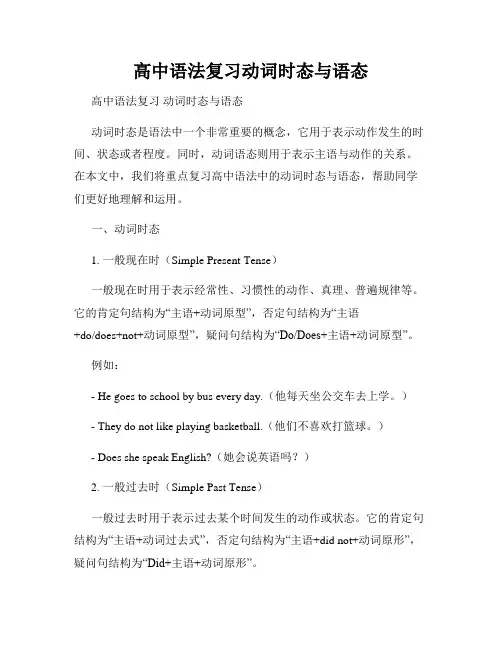
高中语法复习动词时态与语态高中语法复习动词时态与语态动词时态是语法中一个非常重要的概念,它用于表示动作发生的时间、状态或者程度。
同时,动词语态则用于表示主语与动作的关系。
在本文中,我们将重点复习高中语法中的动词时态与语态,帮助同学们更好地理解和运用。
一、动词时态1. 一般现在时(Simple Present Tense)一般现在时用于表示经常性、习惯性的动作、真理、普遍规律等。
它的肯定句结构为“主语+动词原型”,否定句结构为“主语+do/does+not+动词原型”,疑问句结构为“Do/Does+主语+动词原型”。
例如:- He goes to school by bus every day.(他每天坐公交车去上学。
)- They do not like playing basketball.(他们不喜欢打篮球。
)- Does she speak English?(她会说英语吗?)2. 一般过去时(Simple Past Tense)一般过去时用于表示过去某个时间发生的动作或状态。
它的肯定句结构为“主语+动词过去式”,否定句结构为“主语+did not+动词原形”,疑问句结构为“Did+主语+动词原形”。
例如:- I watched a movie last night.(昨晚我看了一场电影。
)- They did not go to the party.(他们没有参加派对。
)- Did you finish your homework?(你完成作业了吗?)3. 一般将来时(Simple Future Tense)一般将来时用于表示将来某个时间会发生的动作或状态。
它的肯定句结构为“主语+will+动词原形”,否定句结构为“主语+will not+动词原形”,疑问句结构为“Will+主语+动词原形”。
例如:- She will go to Beijing next week.(她下周将去北京。
)- We will not have a meeting tomorrow.(明天我们不开会。
英语的时态(讲与练)(一)谓语动词的形式:英语的时态是通过谓语动词的变化来体现的。
因此,了解谓语动词的形式及其变化规律非常重要。
英语的实义动词有以下五种形式:(1)动词原形:动词原形在句子中形式不变。
主要用于主语为第一、二人称的一般现在时,情态动词之后,或根据语法规定必须用动词原形的其他情况。
(2)—般现在时第三人称单数形式(简称现单三):主要用于主语为第三人称单数的一般现在时。
(3)过去式:主要用于一般过去时。
(4)现在分词:主要用于进行时态。
(5)过去分词:主要用于完成时态,或被动语态。
不规则动词的过去式和过去分词有其特殊变化形式,需要个别记忆,课本后页有详细完整的不规则动词表。
谓语动词现在分(二)谓语动词的时态:“时态”就是通过谓语动词的形态变化,来表达动作发生的 时间(现在、过去、将来、过去将来)及所处的状态(一般、进行、完成、完成进行)。
1、一般现在时(1)构成:通常以动词原形表示。
主语为第三人称单数时,用单三形式。
2)用法:1)表示现状、性质、状态和经常的或习惯性的动作。
He has an uncle.他有个叔叔。
Autu mn follows summer. 夏天之后是秋天。
这些动词可与 often, usually, always, sometimes, every day, once a week, on Sun days, n ever 等表示经常性或习惯性的时间状语连用。
例如: Do you ofte n go to the cin ema?你经常去看电影吗?Tom does not study as hard as Jane. 汤姆在学习方面不如简努力。
The pla ne takes off at six past five.飞机将于六点零五分起飞。
Tomorrow is Sun day. 明天是星期天。
Our summer vacatio n begi ns in early July. 我们的暑假七月初开始。
初中英语语法:动词八种时态、被动语态详解练习及答案:一、初中英语被动语态用法小结[1]一、语态概述英语的语态是通过动词形式的变化表现出来的。
英语中有两种语态:主动语态和被动语态。
主动语态表示主语是动作的执行者。
例如:Many people speak Chinese.谓语:speak的动作是由主语many people来执行的.被动语态表示主语是动作的承受者,即行为动作的对象.例如:Chinese is spoken by many people。
英语English是动词speak的承受者。
二、被动语态的构成被动语态由“助动词be+及物动词的过去分词"构成。
人称、数和时态的变化是通过be的变化表现出来的。
现以speak为例说明被动语态在各种时态中的构成.一般现在时:am/is/are+spoken一般过去时:was/were+spoken一般将来时:will/shall be+spoken现在进行时:am/is/are being+spoken过去进行时:was/were being+spoken现在完成时:have/has been+spoken过去完成时:had been + spoken三、被动语态的用法(1)不知道或没有必要说明动作的执行者是谁。
例如:Some new computers were stolen last night.一些新电脑在昨晚被盗了.(不知道电脑是谁偷的)This bridge was founded in 1981。
这座桥竣工于1981年。
(2)强调动作的承受者,而不强调动作的执行者。
例如:The glass was broken by Mike.玻璃杯是迈克打破的。
This book was written by him.这本书是他写的.Your homework must be finished on time.你们的家庭作业必须及时完成。
四、主动语态变被动语态的方法(1)把主动语态的宾语变为被动语态的主语。
动词的时态和语态专题练习The document was prepared on January 2, 2021高中英语语法时态和语态一.动词的时态时态是谓语动词所表示的动作或情况发生时间的各种形式.英语动词有16种时态,但是常见的只有九种:一般现在时、一般过去时、一般将来时、现在进行时、过去进行时、现在完成时、过去完成时、过去将来时、现在完成进行时.(一)一般现在时do / does1.具体用法1 表示经常性或习惯性动作We always care for each other and help each other. 我们总是互相关心互相帮助.He goes to school every day.2)表示现在的特征或状态He is very happy.Do you sing ----A little.3)表示普遍真理Light travels faster than sound. 光速比声速快.Actions speak louder than words. 行动胜过言语.常与一般现在时态连用的词或短语主要有:often, usually, sometimes, every day, every morning/afternoon, on Sundays/weekends等等.I often go to the cinema on Sundays. 我经常星期天去看电影.He goes to work early every day. 他每天上班很早.二一般过去时 did1表示过去某一特定时间所发生的、可完成的动作或状态,常与表示确切过去时间的词、短语或从句连用.例如:We went to the pictures last night and saw a very interesting film.2表示过去习惯性动作.例如:He always went to class last.I used to do my homework in the library.三一般将来时 will / shall do1表示将来打算进行或期待发生的动作或状态.例如:I shall graduate next year.2一般将来时有时可以表示一种倾向或习惯性动作.如Crops will die without water.You won’t succeed without their support.3 几种替代形式:be going to +v在中广泛使用,表示准备做或将发生的事情.例如:I'm going to buy a house when we've saved enough money.be to +v表示计划安排要做的事,具有"必要"的强制性意义.例如:I am to play tennis this afternoon.be about to +v表示即将发生的事情.例如:He was about to start.be due to +v表示预先确定了的事, 必定发生的事.例如:The train is due to depart in ten minutes.5少数动词如:begin, come, leave, go, arrive, start, stop, return, open, close等的一般现在时可用来表示将来的动作.多用来表示按计划事先安排好即将发生的动作,句中通常还有一个表示将来的时间状语.例如:The meeting begins at seven.The train starts at nine in the morning.四现在进行时 is / are doing1)表示现在某时或某段时间内正在进行的动作.常与现在进行时连用的词组是now, right now,at the mother,for the time being,for the present, 或某个具体的时间几点钟.He is writing a letter now.She is visiting Beijing this week.2)有时用来代替一般现在时态,表示一个经常性动作或状态,这时是为了表示一种感情如赞叹,厌烦,满意,不满等He is always thinking of his work. 表示赞许The boy is always talking in class. 表示不满3 有时用来表示一个在最近按计划或安排要进行的动作这时多有一个表示未来的时间的状语We are leaving on Friday. 我们星期五动身.How many of you are coming to the party五现在完成时have / has done1现在完成时用来表示对目前状况仍有影响的,刚刚完成的动作常与yet,already,just连用,或者过去某一时刻发生的,持续到现在的情况常与for,since连用.例如:I have just finished my homework.Mary has been ill for three days.2常与现在完成时连用的时间状语有:since, for, during, over等引导出的短语;副词already, yet, just, ever, now, before, often, lately, recently等;状语词组this week morning, month, year, so far, up to now, many times, up to the present等.例如:So far, she hasn't enjoyed the summer vacation.There have been a lot of changes since 1978.3完成时态可用在下列结构中:This That, It is was the first second... time +定语从句;This That, It is was the only last + n +定语从句;This That, It is was +形容词最高级+ n +定语从句.如果主句的谓语动词是一般现在时,从句的谓语动词通常用现在完成时;如果主句谓语动词是一般过去时,从句谓语动词通常用过去完成时.例如:1This is one of the rarest questions that have ever been raised at such a meeting.2There was a knock at the door. It was the second time someone had interrupted me that evening.六过去进行时 was / were doing过去进行时表示一个过去的动作发生时或发生后,另一个过去的动作正在进行,或表示过去反复的习惯,常与always,continually,constantly等动词连用.例如:1We were discussing the matter when the headmaster entered.2Whenever I visited him, he was always writing at the desk.七过去完成时 had done1表示过去某时间前已经发生的动作或情况,这个过去的时间可以用by,before等介词短语或一个时间状语从句来表示;或者表示一个动作在另一个过去动作之前已经完成.例如:1We had just had our breakfast when Tom came in.2By the end of last year they had turned out 5, 000 bicycles.2动词expect, hope, mean, intend, plan, suppose, wish, want, desire等用过去完成时,表示过去的希望、预期、意图或愿望等没有实现.例如:I had meant to take a good holiday this year, but I wasn't able to get away.另外两种表示"过去想做而未做的事"的表达方式是:1was / were + to have done sth, 例如:We were to have come yesterday, but we couldn't.2intended expected, hope, meant, planned, supposed, wished, wanted, desired + to have done sth, 如:I meant to have told you about it, but I forgot to do so.3过去完成时常用于以下固定句型:1hardly, scarcely, barely + 过去完成时+ when + 过去时.例如:Hardly had I got on the bus when it started to move.2no sooner +过去完成时+ than +过去时.例如:No sooner had I gone out than he came to see me.3by the end of +过去时间,主句中谓语动词用过去完成时.例如:The experiment had been finished by 4 o'clock yesterday afternoon.八一般过去将来时1. 一般过去将来时的形式Should / would+ 动词原形was / were + 动词-ing形式2. 一般过去将来时常用于宾语从句中,其主语的谓语动词为过去时态,可表示从过去某时看来将要发生的事情,如:He said that he would speak at the meeting.He was sixty-eight. In two years he would be seventy.九现在完成进行时 has / have been doing现在完成进行时表示过去某一时刻之前开始的动作或状态一直延续到过去某一时刻.例如:I have been looking for my lost book for three days, but I still haven't found it.运用动词时态要注意的几个问题一在时间和条件等状语从句中不要用将来时态,如We’ll give him the book if he wants it.He decided to fight back if he was hit again.I’ll call you as soon as I’ve finished my work.二时态的一致时态的呼应,如We saw that the smoke was coming from a window.I didn’t know if she would come.He admitted that he had been on the march.不进行时态调整的情况:1从句说的是一种普遍真理,如:Long ago, people didn’t know the earth moves round the sun.2当从句的谓语改成过去时可能造成误会,如Did he say that the train leaves at 5:30三瞬间动词在完成时态中的使用,如:误:I have received her letter for three months.正:I received her letter three months ago.正:It is three months since I received her letter.四注意某些要求一定时态的句型was/ were doing sth. when …did sth.I was reading a book when the bell rangwas/were about to do sth. when … did sth.We were about to leave when the telephone rang.She was about to go out when it started to rain表示做事做了第几次或共几次,要用完成时态,如:It’s the first time I’ve seen her.We have been there three times.It is / has been… since…It is has been two weeks since I came here.She said it was five hours since she had finished her work.hardly…when…We had hardly got in the crops when it began to rain.Hardly had we got in the crops when it began to rain.no sooner…than…I had no sooner come into the room than the door was closed.No sooner had I come into the room than the door was closed.二.动词的语态语态也是动词的一种形式,英语有两种语态:主动语态和被动语态.主动语态表示主语是动作的执行者,而被动语态表示主语是动作的承受者.1We use electricity to run machines. 主动语态2Electricity is used to run machines. 被动语态1.不能用于被动语态的动词和短语1在英语中,不及物动词不能用于被动语态,但有些不及物动词包括短语容易引起误用.如:appear, belong, belong, die, escape, fall, happen, last, remain, succeed, occur, come true, take place, consist of.2某些表示状态或特征的及物动词,如:become, contain, cost, fit, have, resemble, suit也没有被动语态.2.被动语态的时态形式常用的被动语态有下表所列的几种时态形式.时间一般时进行时完成时现在 am asked am being askedis asked is being askedare asked are being asked过去 was be asked was being askedwere be asked were being asked将来 shall be asked shall have been asked will be asked will have been asked过去 should be asked should have been asked将来 would be asked would have been asked 3.短语动词的被动语态短语动词转换为被动语态时,通常被看作是一个动词,后面的介词或副词不能拆开或省略.例如:1So far no correct conclusion has arrived at.2All the rubbish should be got rid of.4."get + -ed分词"的被动语态"get + -ed分词"结构强调动作的结果,而非动作本身,常用来表示突发性的,出乎意料的偶然事件.例如:The boy got hurt on his way home from work.另外,"get + -ed分词"还可用于谈论为自己做的事,是主动的行为而不是被动的行为.例如:get dressed穿衣服 get divorced离婚get engaged订婚get confused迷惑不解get lost迷路get washed洗脸get married结婚5.被动语态与系表结构的区别1The novel was well written.系表结构2The novel was written by Diskens.被动语态6.不能用于被动语态的及物动词,如:have, fit, hold, lack, cost…I have a computer.The hall can hold 200 people.7. 主动性式表被动意义①当feel、look、smell、taste、sound等后面接形容词时;当cut、read、sell、wear、write等词带状语修饰语时;当动词表示“开始、结束、关、停、转、启动”等意义时.This kind of cloth washes easily.这种布易洗.These novels won’t sell well.这些小说不畅销.My pen writes smoothly.我的钢笔写起来很流畅.The door won’t lock.门锁不上.The fish smells good.鱼闻起来香.②当break out、take place、shut off、turn off、work out等动词表示“发生、关闭、制定”等意思时.The plan worked out successfully.The lamps on the wall turn off.③want, require, need后面的动名词用主动表示被动含义.④be worth doing用主动形式表示被动含义.⑤在“be + 形容词+ to do”中,不定式的逻辑宾语是句子的主语,用主动代被动.This kind of water isn’t fit to drink.The girl isn’t easy to get along with.另外:be to blame受谴责,be to rent出租也用主动形式表被动.Choose the right answer1. They _____ friends since they met in Shanghai.A. have madeB. have becomeC. have beenD. have had2. The secretary is going to report to the manager as soon as he ______.A. will arriveB. arrivesC. is going to arriveD. is arriving3. We all know that ice ______.A. feel coldB. is felt soldC. is feeling coldD. feels cold4. ---This cloth _____ well and _____ long.--- OK. I’ll take it.A. washes ; lastsB. is washed; lastedC. washes, is lastedD. is washing, lasting5. Helen _____ her key in the office so she had to wait until her husband_____ home.A. has left; comesB. left; had comeC. had left; cameD. had left; would come6. It _____ every day so far this week.A. is rainingB. rainedC. rainsD. has been raining7. --- Are you going to the movies tonight--- Yes, I ______ my work by that time.A. will finishB. finishC. am going to finishD. will have finished8. --- Was the driving pleasant when you vacationed in Mexico last summer--- No, it _____ for four days when we arrived, so the roads were very muddy.A. was rainingB. would be rainingC. had been rainingD. has rained9. You won’t know if the coat fits you until you _____ it on.A. will tryB. are tryingC. triedD. have tried10. My dictionary _______, I have looked for it everywhere but still _______.A. has lost; don’t findB. is missing; don’t findC. has lost; haven’t foundD. is missing; haven’t found11. --- How long ______ each other before they _____ married--- For about a year.A. have they known; getB. did they know; were going to getC. do they know; are going to getD. had they known; got12. --- Come in, Peter, I want to show you something.--- Oh, how nice of you. I _____ you _____ to bring me a gift.A. never think; are goingB. never thought; were goingC. didn’t think; are goingD. hadn’t thought; were going13. When Jack arrived he learned Mary _______ for almost an hour.A. had goneB. had set offC. had leftD. had been away14 --- I’m sorry to keep you waiting.--- Oh, not at all. I ______ here only a few minutes.A. have beenB. had beenC. wasD. will15. The police found that the house _______ and s lot of things ______.A. has broken into; has been stolenB. had broken into; had beenstolenC. has been broken into; stolenD. had been broken into; stolen16. --- Have you moved into the house--- Not yet. The rooms ________.A. are being paintedB. are paintingC. are paintedD. are beingpainting17. If the city noises _______ from increasing, people ______ shout to be heard at the dinner table 20 years from now.A. are not kept ; will have toB. are not kept; have toC. do not keep; will have toD. do not keep, have to18. --- ________ the sports meet might be put off.--- Yes, it all depends on the weather.A. I’ve been toldB. I’ve toldC. I’m toldD. I was told19. I don’t think Jim saw me; he ______ into space.A. just stared 凝视B. was just staringC. has just staredD. had just stared20. --- _______ my glasses--- Yes, I _______ them on your bed a minute ago.A. Do you see; sawB. Had you seen; have seenC. Have you seen; sawD. Would you see; saw21. --- We could have walked to the station; it was so near.--- Yes. A taxi _______ at all necessary.A. wasn’tB. hadn’t beenC. wouldn’t beD. won’t be22. --- Who is Jerry Cooper--- ______ I saw you shake hands with him at the meeting.A. Don’t you meet him yetB. Hadn’t you met him yetC. Didn’t you meet him yetD. Haven’t you met him yet23. --- Nancy is not coming tonight.--- But she _______A. promisesB. promisedC. will promiseD. had promised24. _______ it with me and I’ll see what I can do.A. When leftB. LeavingC. If you leaveD. Leave25. It is clear that his poor education _______ him back.A. has been heldB. is holdingC. will be heldD. had held26. --- How are you planning to travel to Shanghai--- I ____ yet, but I ______ taking a train.A. haven’t decided; am consideringB. haven’t decided, considerC. didn’t decided; am consideringD. hadn’t decided; haveconsidered27. The pen I _______ I _______ is on my desk, right under my nose.A. think, loseB. thought , had lostC. think , had lostD. thought, have lost28. --- Have you heard about the new school--- No, when and where to build the new one _______ yet.A. is not decidedB. are not decidedC. hasn’t decidedD. haven’t decided29. --- Sorry, I’m late.--- That’s OK. I _____ long.A. haven’t waitedB. don’t waitC. haven’t been waitingD.didn’t wait30. --- Nancy sat in the front seat on the left side of the classroom.--- Oh I thought she ______ in the back.A. will sitB. had satC. is sittingD. has sat31. I ______ my face when suddenly someone ______ at the door.A. washed, knockedB. washed, was knockingC. was washing, was knockingD. was washing, knocked32. I ______ at the station half an hour ago, but the train _____ yet.A. arrived, hadn’t comeB. was arriving, hadn’t comeC. arrive d, hasn’t comeD. had arrived, didn’t come33. --- Why did you come by taxi--- My car broke down last week and I still _______ it repaired.A. haven’t hadB. didn’t haveC. don’t haveD. won’t have34. I’m surprised to find you here looking well and playing tennis, Jim. Annsaid that you _____ sick.A. areB. wereC. would beD. had been35. The price _________, but I doubt whether it will remain so.A. went downB. will go downC. has gone doneD. was going down36. --- Did you go to Qingdao for vacation last August--- I _______ to go, but I got sick at the last minute.A. was planningB. had been planningC. plannedD. have planned37. I finally got the job I dreamed about. Never in my life _____ so happy.A. did I feelB. I feltC. I had feltD. had I felt38. --- How are you today--- Oh, I ________ as ill as I do now for a very long time.A. didn’t feelB.wasn’t feelingC. don’t feelD. haven’t felt39. The reporter said the UFO ______ east to west when he saw it.A. was travellingB. travelledC. had been travellingD. was totravel40. --- I think that you need ______ practice on playing the violin.--- ______ violin lessons every two weeks, but I think I’ll make it every week from now on.A. less; I haveB. less; I’ve takingC. more; I haveD. more; I’ve been having41. I remember ______ for the job, but I forget the exact number.A. to be paidB. being paidC. get paidD. that I receive pay42. By this time you come, I ______ the task ______ to me last month.A. have finished, givenB. will have finished, to be givenC. will have finished, givenD. have finished, to be given43. There was a knock at the door. It was the second time that someone ______ me that evening.A. to have interruptedB. would have interruptedC. had interruptedD. to interrupt44. ---- It is a long time ______ I saw you last.---- Yes. And it will be a long time ______ we see each other again.A. before, sinceB. since, beforeC. then, thenD. when, when45. We ______ that you would be able to visit us, but you did not.A. hopeB. hopedC. had hopedD. are hoping46. Mary felt both unprepared and nervous about the interview which she______ the next day.A. was bout to faceB. is going to faceC. will faceD. was to face47. In such dry weather, the flowers will have to be watered if they ______.A. have survivedB. are to surviveC. would surviveD. will survive48. ---- Are you member of the club---- ______. It’s ten years since I ______ a member of the club., was B. No, became C. Yes, had been D. No, was49. She ______ law the moment she has finished high school.A. is going to studyB. is to studyC. is about to studyD. will be studying50. The bikes produced in that factory are of high quality. So they ______ well both at home and abroad.A. sellB. are soldC. may be soldD. are to be sold。
动词的时态和语态一、知识框架二、知识梳理动词不定式的基本形式是“to+动词原形”有时可以不带to,否定式:not + (to) do。
动词不定式没有人称和数的变化,在句子中不能作谓语,但具有名词、形容词、副词的特征,可以担任主语、表语、宾语、定语、状语和宾语补足语。
动词不定式仍保留动词的一些特点。
一)不定式的句法功能(1)作主语:不定式作主语时,一般表具体的、个别的、一次性的或具有将来意义的动作。
To forgive is the best virtue of life.人生最好的美德是宽恕。
To finish the work in ten minutes is very hard. 十分钟之内完成这项工作是很难的。
To lose your heart means failure. 灰心意味着失败。
若主语较长,常用it作形式主语,真正的主语不定式置于句后,上面两句可用如下形式:It is very hard to finish the work in ten minutes.It means failure to lose your heart.常用句式有:It+be+名词+to doIt takes sb+some time+to doIt+be+形容词+of/for sb +to doHow + adj. + it is + to do sth.!①如果句中的形容词表示人物特征或品质,常同of搭配构成“It is + 形容词+of+代词(名词)+不定式”句型。
如:bold, brave, careful, careless, considerate, cruel, rude, generous, right, wrong, kind, nice, good, polite, clever, wise, foolish, silly等。
②表示事物性质的形容词如easy, difficult, hard, important, impossible, possible, safe, dangerous, necessary常同for 搭配。
时态和语态练习题时态和语态练习题时态和语态是英语语法中非常重要的概念,掌握它们对于正确表达和理解英语句子至关重要。
在本篇文章中,我们将通过一些练习题来巩固对时态和语态的理解和运用。
一、时态练习题1. 他昨天去了图书馆。
(用一般过去时)2. 我正在看电视,突然停电了。
(用现在进行时和一般过去时)3. 明天我将去北京旅行。
(用一般将来时)4. 他已经吃完晚饭了吗? (用现在完成时)5. 我们正在学习英语已经两个小时了。
(用现在进行时和一般过去时)答案:1. He went to the library yesterday.2. I was watching TV when suddenly the power went out.3. I will travel to Beijing tomorrow.4. Has he finished dinner already?5. We have been studying English for two hours.二、语态练习题1. 他们正在修建一座新桥。
(用被动语态)2. 我的妹妹打破了花瓶。
(用被动语态)3. 他们已经完成了这项任务吗? (用被动语态)4. 他们正在为我们准备晚餐。
(用被动语态)5. 他们将会邀请你参加派对。
(用被动语态)答案:1. A new bridge is being built by them.2. The vase was broken by my sister.3. Has this task been completed by them?4. Dinner is being prepared for us by them.5. You will be invited to the party by them.通过以上的练习题,我们可以巩固对时态和语态的理解和运用。
时态的正确使用可以帮助我们准确地表达过去、现在和将来的动作和状态,而语态的正确使用可以使句子更加准确和流畅。
语法对点讲练一时态、语态一、现在时态学问点讲解1.一般现在时①表示经常性的或习惯性的动作、状态、性能等。
常与表示频度的时间状语always, seldom, often, sometimes, every day, once a week等连用。
②表示客观真理、格言以及不受时间限制的客观存在。
The earth moves around the sun.③在时间、条件、让步状语从句中用一般现在时表示将来时,主句多用一般将来时。
④表示按时间表、方案、规定发生的动作。
2.现在进行时⑤表示说话时正在进行的动作或存在的状态。
⑥表示现阶段正在进行的动作或发生的事情。
⑦与always, constantly, frequently, continually, forever, all the time等连用,表示赞美、赞扬、厌恶、不满等情感。
⑧come, go, start, open, close, arrive, return, begin, leave等动词用于进行时,表示按方案、支配即将发生的动作。
⑨不用于进行时态的动词:表示存在的动词:stay, remain, keep, contain等。
表示全部的动词:have, belong to, own, hold, possess等。
表示感观的动词:look, seem, appear, taste, feel, sound等。
表示情感的动词:love, like, prefer, hate等。
表示思想、信念的动词:think (认为), consider (认为), believe, trust, guess, wonder, forget, know, understand, realize, suppose, agree等。
3.现在完成时⑩表示过去的动作或事情对现在的影响或结果,常用的时间状语有:recently, lately, before, yet, ever, never, once, just等。
时态和语态是高考必考考点,主要集中在各种时态的习惯用法及对时态与主谓一致的综合考查。
复习时态和语态时应注意以下几点:1.进行时态与一般时态的区别;2.现在完成时与现在完成进行时的区别;3.某些句式、从句以及虚拟语气中的时态。
表1 主要时态使用注意事项表2 易混时态用法比较表3 被动语态的构成表4 被动语态的特殊用法一、考点聚焦动词的时态常和语态、主谓一致结合在一起进行考查。
然而,英语时态多达16种,常用的也有8种之多,且近几年的高考在考查时态时,形式灵活多样,多体现在上下文语境中,且融多个考点于一题,这样无形中增加了试题的难度。
其实,纵观近几年的时态语态题,我们不难发现其命题的三个角度:一是直接给定时间状语,考生可直接根据所给时间状语作出选择;二是给定时间状语,但所给时间状语有着较强的干扰性和迷惑性,考生不能直接根据时间状语进行选择;三是题干中不提供任何时间状语,而给出一个上下文情景或一个结构较为复杂的句子,考生必须仔细分析语境,才能作出判断并选择最佳答案。
二、真题再现与技巧点播答题时,研读题干,搜索出尽可能多的“时间参考信息”,如:haven’t said, was doing等,这些表达中都含有时间信息,发现和有效利用这些信息是解决问题的关键。
解决时态和语态问题,要遵循如下解题思路:①这个动作可能发生在什么时间?题干句中可参照的时间信息有那些?④这个动作处于什么时态,是进行中,还是已经结束(完成)?限制或修饰这个动作的状语信息有哪些?③这个动作与主语的关系,是主动还是被动?只要全面细致地考虑了这些问题的答案,试题的正确答案也就水落石出了。
具体技巧如下:(一)根据题干中的时间标志词选择时态1. ---The window is dirty.--- I know. It ________ for weeks. (04全国卷III)A. hasn’t cleanB. didn’t cleanC. wasn’t cleanedD. hasn’t been cleaned2. Scientists think that the continents always where they today. (05北京)A. aren’t; areB. aren’t; wereC. weren’t; areD. weren’t; were3. They on the program for almost one week before I joined them, andnow we it as no good results have come out so far. (05江苏)A. had been working; are still workingB. had worked; were still workingC. have worked; were still workingD. have worked; are still working4. The country life he was used to greatly since 1992. (05山东)A. changeB. has changedC. changingD. have changed5. With more forests being destroyed, huge quantities of good earth each year.(05山东)A. is washing awayB. is being washed awayC. are washing awayD. are being washed away6. --________David and Vicky ________married?--For about three years.(2003北京)A. How long were;beingB. How long have;gotC. How long have;beenD. How long did;get[命题角度]动词时态须与句中时间状语一致。
高考题常在题干中加入具体情景,以测试考生对动词时态知识的实际运用能力。
[应对策略]敏锐捕捉时间标志词,并结合具体的语境,选择出正确的动词时态。
(二)根据主从句时态呼应的原则选择时态7. When the old man to walk back to his house, the sun itself behind themountain. (05湖北)A. started; had already hiddenB. had started; had already hiddenC. had started; was hidingD. was starting; hid8. --- What would you do if it tomorrow? (05全国)--- We have to carry it on, since we’ve got everything ready.A. rainB. rainsC. will rainD. is raining9. As soon as he comes back, I’ll tell him when and see him. (05北京)A. you will comeB.will you comeC. you comeD. do you come[命题角度]近年来的高考试题一般不再单纯考查主从句的时态呼应,而是将其放在真实的并且符合实际的语境中进行考查,也会结合强调结构等其它语法现象进行考查。
[应对策略]在根据时态呼应原则解题时,要把握好以下几点:①在时间、条件等状语从句中,用一般现在时态表示一般将来时态,一般过去时态表示过去将来时态,用现在完成时态表示将来完成时态。
②正确认定主句动词及从句动词两个动作发生的时间,并认真体会命题者所给出的语境。
③解答宾语从句与主句时态呼应题时,考生应熟知以下规则: 如果主句动词为现在时态,则从句动词可根据需要使用任何时态; 如果主句动词为过去时态,则从句动词须用合适的过去的某种时态(表示客观真理时使用一般现在时态)。
(三)根据具体的语言环境选择时态10. Years ago we didn’t know this, but recent science_________ that people who don’tsleep well will soon get ill.(05广东)A.showedB.will showC.has shownD.is showing11. The coffee is wonderful! It doesn’t taste like anything I before. (05全国卷II)A.was havingB.haveC.have ever hadD.had ever had12. The hero’s story _______ differently in the newspapers. (05全国)A.was reportedB.was reportingC.reportsD.reported13. Now that she is out of job, Lucy ______ going back to school, but she hasn’t decided yet.(04北京)A. had consideredB. has been consideringC. consideredD. is going to considerM1-M3语法—时态和语态语法检测I. 用所给动词的正确时态语态填空1. The classroom ___________________(clean) by students every day.2. The museum ________________________ (build) in 1923.3. It is said that a new hospital ____________________(build)next year in this area.4. The machine ________________________________(repair) at this time yesterday.5. The book __________________ (sell) well.6. The fire ____________________ (break out) during the night.7. The stars _________________________ (can not see) in the daytime.8. She found the house __________________________(break) into when she got home.9. He _____(give) the nickname, "the student who asks questions".10. We ______________________(learn) a lot of knowledge since we came here.II. 单项选择1. She _____ her pen in her room now.A. findsB. is findingC. looks forD. is looking for2. It was not long before the water _____ cold.A. is feelingB. feelsC. feltD. was feeling3. She ____ to her hometown several times.A. has beenB. has goneC. wentD. is going4. Jane _____ some washing this time yesterday.A. is doingB. had doneC. was doingD. did5. When I got to the school, the first class _____.A. had begunB. beganC. is beginningD. has begun6. Mother promised she _____ me an English-Chinese dictionary.A. is buyingB. will buyC. would buyD. has bought7. If it _____, we will go to visit the zoo.A. not rainsB. doesn’t rainC. won’t rainD. isn’t going to rain8. It is getting late. It’s time we _____.A. goB. wentC. are goingD. must go9. I haven’t seen her _____.A. two weeks agoB. since two weeksC. for two weeksD. before two weeks10. My brother _____ the Youth League since 1990.A. joinedB. has been inC. has joinedD. had joined11. — Who is Clarke?— ____ him yet? I saw you shaking hands with him at the meeting.A. Haven’t you metB. Hadn’t you metC. Didn’t you meetD. Don’t you meet12. — Lucy is not coming tonight.— But she ___!A. had promisedB. will promiseC. promisedD. promises13. She will stop showing off if no notice____ of her.A. is takenB. takesC. will be takenD. has taken14. Diamond ____in Brazil in 1971.A. is foundB. has been foundC. was foundD. had been found15. “Have you moved into the new flat?” “Not yet. The room ____.”A. has been paintedB. is paintedC. paintsD. is being painted16. The reason for all the changes being made ____to us yet.A. has not explainedB. has not been explainedC. did not explainedD. were not explained17. As we approached the work site, the workers were seen ____the new house.A. buildingB. buildC. builtD. to build18. Hurry up, or the tickets ___out by the time we get there.A. will have soldB. will sellC. have soldD. will have been soldIII.高考链接:1.[2011全国卷Ⅰ,23]Planning so far ahead _____ no sense—so many things willhave changed by next year.A. madeB. is makingC. makesD. has made2.[2011辽宁,28]I’ll go to the library as soon as I finish what I _____.A. was doingB. am doingC. have doneD. had been doing3.[2011北京,27]—That must have been a long trip.—Yeah, it _____ us a whole week to get there.A. takesB. has takenC. tookD. was taking4.[2011浙江,15]The manager was worried about the press conference his assistant ______ inhis place but, luckily, everything was going on smoothly.A. gaveB. givesC. was givingD. had given5.[2011陕西,12]His first novel _____ good reviews since it came out last month.A. receivesB. is receivingC. will receiveD. has received6.[2011北京,23]Tom _____ in the library every night over the last three months.A. worksB. workedC. has been workingD. had been working7.[2011江西,30]We arrived at work in the morning and found that somebody _____ into theoffice during the night.A. brokeB. had brokenC. has brokenD. was breaking8.[2011全国卷Ⅰ,29]When Alice came to,she did not know how long she______ there.A. had been lyingB. has been lyingC. was lyingD. has lain9.[2011上海,34]Did you predict that many students _____ up for the dance competition?A. would signB. signedC. have signedD. had signed10.[2011天津,4]On her next birthday,Ann ______ married for twenty years.A. isB. has beenC. will beD. will have been11.[2011北京,21]Experiments of this kind _____ in both the U.S. and Europe well before theSecond World War.A. have conductedB. have been conductedC. had conductedD. had been conducted12.[2011安徽,26]—What do you think of store shopping in the future?—Personally, I think it will exist along with home shopping but _____.A. will never replaceB. would never replaceC. will never be replacedD. would never be replaced13.[2011天津,3]In the last few years thousands of films _____ all over the world.A. have producedB. have been producedC. are producingD. are being produced14.[2011上海,31]After getting lost in a storm, a member of the navy team _____ four days later.A. rescuedB. was rescuedC. has rescuedD. had been rescued15.[2011四川,9]All visitors to this village _____ with kindness.A. treatB. are treatedC. are treatingD. had been treated16.[2010浙江,5]If you plant watermelon seeds in the spring, you _____fresh watermelon in the fall.A. eatB. would eatC. have eatenD. will be eating17.[2010上海,31]The church tower which _____ will be open to tourists soon. The work is almostfinished.A. has restoredB. has been restoredC. is restoringD. is being restored18.[2009上海,36]During the period of recent terrorist activities, people _____ not to touch anyunattended bag.A. had always been warnedB. were always being warnedC. are always warningD. always warned。